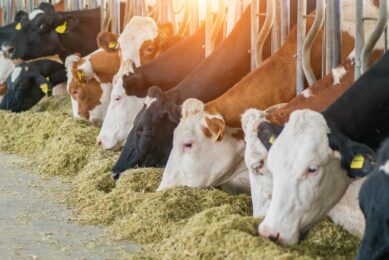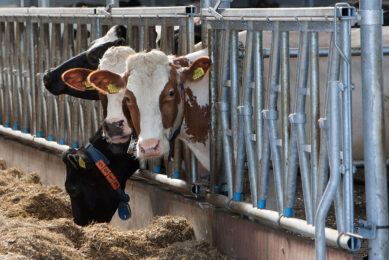Successfully reducing carbon emissions
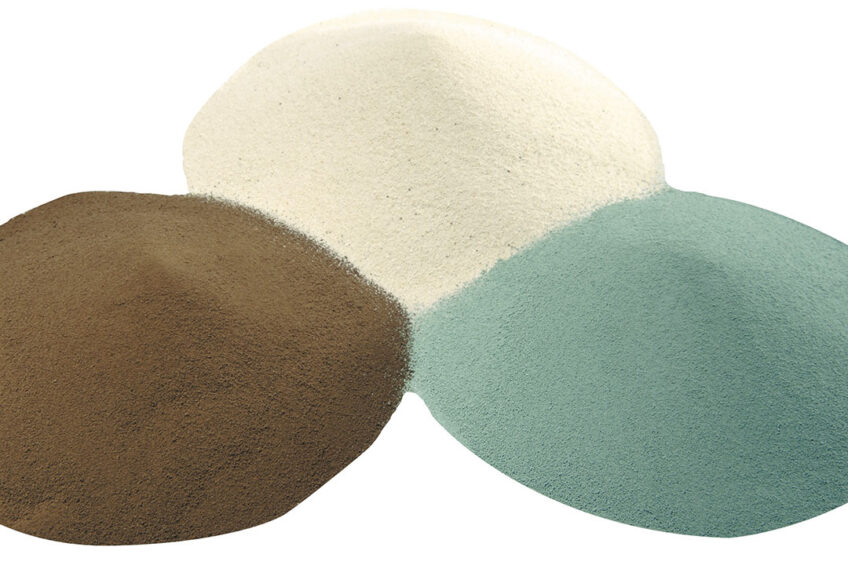
It should be no secret that a major push is underway in the animal nutrition industry to develop products, programs and practices that will significantly reduce the CO2eq emissions of livestock. While much progress has been achieved, there is still a long way to go to achieve the objectives that various government and consumer groups have established as obtainable targets.
One key finding that has emerged so far is that it is highly unlikely that any one product, program or practice will, by itself, achieve the targeted Co2eq reduction objectives that have been set. Rather, the quest to achieve a significant reduction in livestock-based CO2eq emissions will need to be a group endeavour, with several products, programs and practices contributing to a successful outcome.
The use of certain feed additives to reduce CO2eq emissions in dairy cattle is continuing to show promise, based on ongoing research results. When evaluating these additives, it is important to know how they function in the animal to support a lower carbon footprint.
Most feed additives used in dairy cattle can be included in 2 primary groups. The first group, the direct-effect additives (3-NOP, nitrates, phytobiotics, enzymes, seaweed, etc.), have a direct impact on the ability of rumen microbes to manufacture and emit methane into the environment. The second group comprises feed additives that have been proven via independent research to significantly improve a dairy cow’s feed efficiency, thereby reducing the level of methane emissions produced per unit of productivity.
Reviews of the results of different additives show that individual additives can deliver a reduction in the animal’s carbon footprint ranging from 2-12%. While this is positive, it is clear that no single additive from either group can deliver the 30% reduction the industry is being asked to deliver in the next 5-10 years. Success will depend on selecting a group of verified additives to work in tandem with other proven sustainability practices such as optimising cow comfort, correct ingredient selection and genetic selection to deliver targeted CO2eq results.
Life cycle assessment
To help producers select the right group of products, programs and practices, various government, NGO and industry groups have agreed on a set of guidelines that must be used to evaluate a feed additive’s contribution to the reduction of CO2eq in livestock. At the heart of this evaluation is a life cycle assessment (LCA) tool. The LCA is a comprehensive template that must be completed for each proposed feed additive. Its purpose is to evaluate in detail the data supporting the ability of the feed additive to provide a sustainable reduction in CO2eq.
Following the completion of the LCA, an independent review must be performed to ensure the LCA was completed in accordance with all approved guidelines (ISO 14040 and 14044 statues). If the information is assessed to be correct, the LCA’s outcome will be verified, providing the producer with an independent recommendation on the potential value of the additive if included within their CO2eq reduction program.
Dairy cattle
How can your trace mineral program contribute to a reduction in CO2eq levels in dairy cattle? Multiple studies conducted at several independent research locations have continued to demonstrate that when Selko IntelliBond Z, C and M are used to replace Zn, Cu and Mn sulfate in dairy rations, neutral detergent fibre digestibility (NDFd) can be improved by approximately 2 points (see Figure 1).
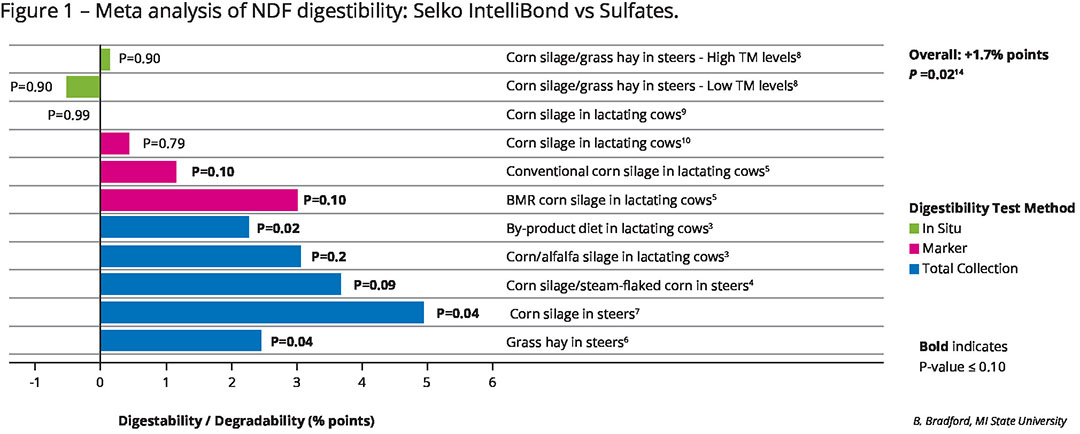
Using data published by Oba and Allen, Michigan State University, this level of NDFd improvement could represent a 0.5kg increase in energy corrected milk (ECM) production, representing a significant increase in feed efficiency in the cow. This finding was confirmed in studies looking at milk production of dairy cows (see Figure 2). Based on this growing body of research, Selko Feed Additives commissioned a comprehensive LCA to understand the value of replacing sulfate-based trace minerals with Selko IntelliBond Z, C and M on the cow’s carbon footprint. Results of the LCA indicated the ability of IntelliBond Z, C and M to help reduce the cow’s carbon footprint by up to 2% per kg of ECM.
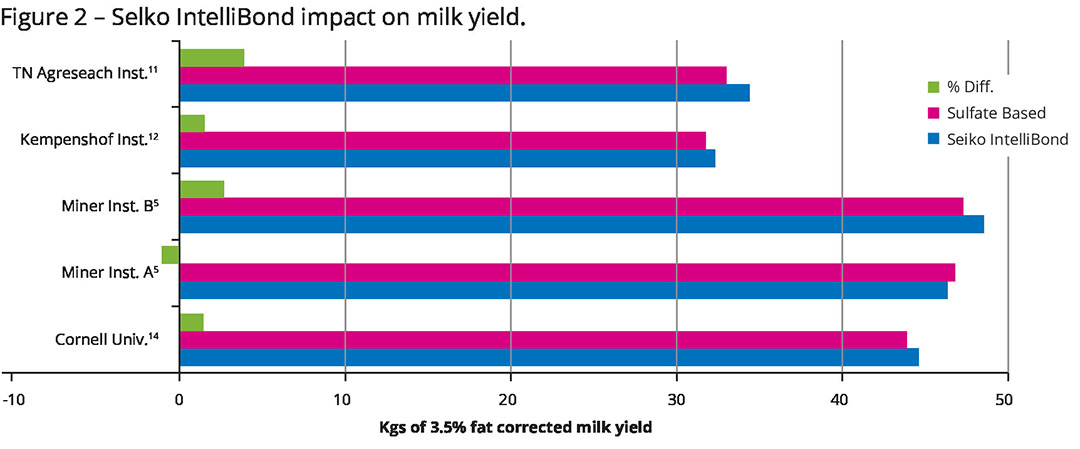
Subsequent, independent review verified the findings of the LCA. IntelliBond Z, C and M is therefore the first family of trace minerals to be independently verified to assist with the reduction of the cow’s carbon footprint.
Beyond the need to lower the cow’s carbon footprint is the growing need of premixers and feed compounders to provide their customers with a total CO2eq number for the products they sell. This number allows nutritionists and manufacturers to evaluate the individual CO2eq impact of various ingredients being added to the blend, with the objective of lowering the blend’s total CO2eq while maintaining its nutritional requirements.
To assist with this growing need, Selko Feed Additives recently completed the development and independent review of an LCA that identifies the carbon footprint for each of Selko IntelliBond’s individual products (see Table 1). These values are only specific to the highly efficient Selko IntelliBond manufacturing process and will be of value to feed compounders and premixers who are working to reduce their products’ carbon footprints.
Solving the carbon footprint challenge will require the combined use of multiple feed additives that have been verified to reduce the cow’s carbon footprint in combination with many additional management practices. Trace mineral selection should not be overlooked in this process, given the proven ability of Selko IntelliBond to assist with reducing the cow’s carbon footprint while optimising productivity and health.
During a recent webinar, Professor Ermias Kebreab from UC Davis gave an overview of the different strategies that can be applied by the dairy industry to meet their carbon footprint reduction targets. Click here to view the recordings.
Join 13,000+ subscribers
Subscribe to our newsletter to stay updated about all the need-to-know content in the dairy sector, two times a week.



